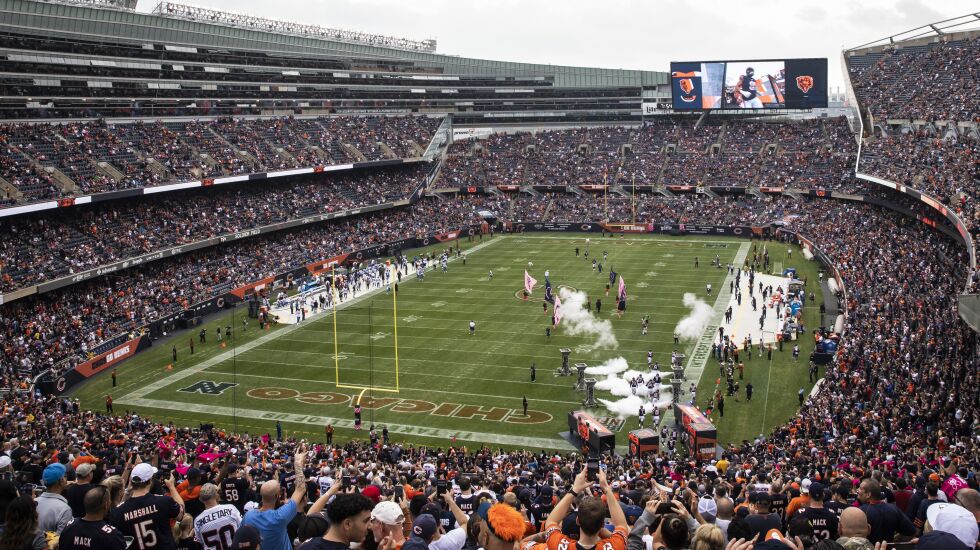
Arguing that there is “no tasteful way” to attach a corporate name to a “sacred” war memorial, former Illinois Governor Pat Quinn is reprising the fight he waged more than 20 years ago to preserve the name Soldier Field.
One day after Mayor Lori Lightfoot unveiled her $2.2 billion plan to keep the Bears at a domed and renovated Soldier Field, Quinn launched his campaign to deprive the mayor of the only funding source she has revealed so far to bankroll the ambitious project: selling corporate naming rights.
Quinn introduced yet another “citizens ordinance” to get an advisory referendum on the Feb. 28 ballot that would ask voters a loaded question:
“Shall the people of Chicago protect the good name of Soldier Field — which is a war memorial dedicated to the memory of soldiers who fought for our American democracy — by prohibiting the mayor, City Council, Park District or any other governmental entity from attaching a corporate name to Soldier Field or selling the naming rights to Soldier Field in any way?”
Quinn believes the answer will and should be a resounding “No.”
He argued a “solemn commitment was made” after the terrorist attacks of Sept. 11, 2001, to retain the name Soldier Field and that promise should be honored forever.
“Overwhelmingly, the people of Chicago will say ‘no’ to selling the naming rights of Soldier Field or attaching the name of Soldier Field to ‘Commonwealth Edison Park at Soldier Field’ or ‘Amazon Stadium at Soldier Field.’ It’s a sacrilege to do that,” Quinn said.
“The people of Chicago don’t want their war memorial attached to a corporate name for money. It’s just not right. We’re Chicago. And we’re Soldier Field. We’re not Jacksonville. There’s no tasteful way of attaching a corporate name … to a war memorial. It’s a desecration.”
Jacksonville’s VyStar Veterans Memorial Arena was cited by a mayoral working group as an example of selling naming rights in a respectful way.
Chicago mayors and their City Council allies have a long history of using the three-referenda-per-election limit to their advantage. They routinely put innocuous referenda on the ballot to crowd out more controversial questions.
The question will only make it on the ballot if the City Council reverses field and agrees to put it there. That runs the risk of bolstering turnout from an already ornery electorate that may be poised to take their anger out on incumbent alderpersons and an incumbent mayor.
The same fate likely awaits the citizens ordinance Quinn introduced in June to get a binding referendum on the ballot imposing a two-term limit on Chicago mayors.
Quinn challenged the council to “listen to the voters” and put both questions on the ballot.
“People do want a chance to vote on whether the mayor should have a two-term limit. Same way on whether or not Soldier Field’s name will be protected from corporate encroachment. These are vital issues that people pay attention to and care about,” Quinn said.
“I would think any alderman worth his or her salt would vote ‘yes’ to put ’em both on. … They had no problem putting plastic straws on last time. This is a much higher [priority] and more important issue. … We really have to honor those who raise their hand and say, ‘Take me’ when it comes to volunteering for our military.”

Though a naming rights question — if it makes it on the ballot — would be purely advisory, Quinn argued it would be binding in practice because “politicians follow the election returns.”
Soldier Field’s most recent makeover, a $660 million project completed in 2003, won’t be paid off for another decade.
After the terrorist attacks of Sept. 11, 2001, decimated the hotel tax revenues being used to fund that renovation, then-Mayor Richard M. Daley salvaged the plan in part by pressuring the Bears to permanently forfeit their right to sell corporate naming rights to Soldier Field.
That decision followed months of demonstrations and other pressure tactics by Quinn and the veterans whose cause he has long championed.
Still, that didn’t stop the 23-member “working group” that Lightfoot charged with “re-imagining” Soldier Field and the Museum Campus from resurrecting the idea of selling naming rights “in a way that respects Soldier Field’s legacy as a war memorial by keeping Soldier in the name of the facility.”
Quinn is spending the summer mulling a race for mayor against Lightfoot armed with a poll pegging her public approval rating at 25.8%.
He branded the $2.2 billion stadium plan “preposterous.”
“To spend that kind of money to help a professional football team that’s now worth $4 billion that’s already had a corporate welfare bailout 20 years ago makes no sense,” he said.
“If we’re gonna invest that kind of money, we should invest it in public safety and early childhood education as the best way to prevent violence.”







